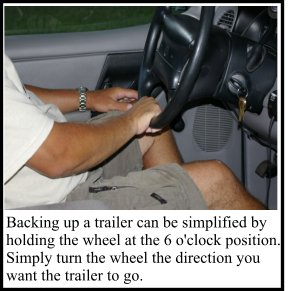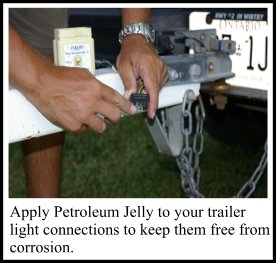Tricks of the Trade for Trailers Whether it is to pull a boat or transport an ATV, the majority of outdoor folk rely heavily on trailers to get their equipment from point A to B. Most of us know the reasoning behind ramp etiquette, as well as the importance of hitch strength and ball size. But what about the real nitty-gritty, the tricks of the trade that can only be gained through years of pulling on the road? This guide showcases some of the tips I've learnt over the seasons, which have helped make my trailering more enjoyable and worry-free.
Back It Up And the second: for those that get confused (what way will the trailer go??) when turning the wheel and backing up, here's a simple solution. Instead of holding the wheel at the 12 o'clock position (top), place your hand at the 6 o'clock position (bottom). By holding the steering wheel such as this, the trailer will turn left when the wheel is turned to the left and move right when you steer right. This technique is much easier to grasp than the "opposite" scenario when working the wheel from the direct top, and leaves you with one less thing to think about when trying to make your maneuvers.
Stop the Corrosion Another helpful tip is to purchase a small power tester (found at most automotive stores) that can be placed on your tow vehicle connection cable when not hooked up to your trailer. This will seal and protect your connections, while also giving you a handy gauge on power. For the trailer plug, I've found a simple sandwich bag and twist tie works great for protection when the trailer is not in use. If you're experiencing a rusty trailer hitch ball, a few swipes with a metal-bristled brush and some rust-inhibiting paint will do the trick. I also like to use a cover, made from plastic or foam, to place over the ball when not in use. And one last tip in regards to lights - always carry spare bulbs and fuses. I've had fuses blow causing a lack of lights, as well as bulbs burning out. A quick and easy fix if you have the right materials to do the job, but a possible disaster when heading home from a dark launch and not a store in sight. (It goes without saying to unplug your lights each time before backing the boat into the water.)
Weight Distribution A rule of thumb for proper weight distribution calls for 7 to 12% of the total weight of your loaded trailer to be positioned at the trailer coupling ball when the tongue is parallel to the ground. (Specific manufacturers may use a different weight percentage - please check your manual.) A simple bathroom scale can be used to measure the weight over the ball hitch, and a calculation can be made to figure out the weight of the entire trailer. Keep the forward weight between the given formula, and the chances of problems on the road are greatly minimized.
Wash Her Down A simple soap and water solution will do for your trailer, and I've had success using an ordinary car wash solution. Lather up with a scrub brush and rinse her down. It's also a good idea to use a protective wax on the metal of your trailer, as this will prolong the life of it, ensuring a long and rust-free existence. If you spot any rust on the frame of your trailer, carefully sand down the area with a metal brush or circular sander and apply a good coat of rust inhibiting paint. Most manufacturers can supply you with a small bottle of corresponding touch-up paint to make it look new again.
Storing The Tires Another issue that can arise when rubber tires are left in the same spot, and exposed to the ground is tire rot. Jacking your trailer off the ground will reduce the occurrence of dry rot, as will moving it periodically. I hope this information has given you a better insight into the world of trailers. Much like anything, if you care for them and follow the basic of rules, they will provide you with a lifetime of enjoyment. Have fun out there and happy towing!
|


 man
that day, and two things still stick in my head. The first is: reverse
S-L-O-W. The faster you back up a trailer, the harder it is to correct any
over steering faults, obviously leading to bigger mistakes and more
jackknifing. A slow and steady reverse will help you maintain the
straightness of the trailer's route - the exact thing you want to happen.
man
that day, and two things still stick in my head. The first is: reverse
S-L-O-W. The faster you back up a trailer, the harder it is to correct any
over steering faults, obviously leading to bigger mistakes and more
jackknifing. A slow and steady reverse will help you maintain the
straightness of the trailer's route - the exact thing you want to happen.  boat
come springtime. The reason is simple - water, salt and air will
disintegrate this metal contact spot, leaving your lights useless and
without power. The first step to combat this is to liberally apply
petroleum jelly to the male connectors every few weeks throughout the
season. This coating will protect inner and outer workings from the
environment, and will also make connecting your lights a quick and easy
breeze.
boat
come springtime. The reason is simple - water, salt and air will
disintegrate this metal contact spot, leaving your lights useless and
without power. The first step to combat this is to liberally apply
petroleum jelly to the male connectors every few weeks throughout the
season. This coating will protect inner and outer workings from the
environment, and will also make connecting your lights a quick and easy
breeze.